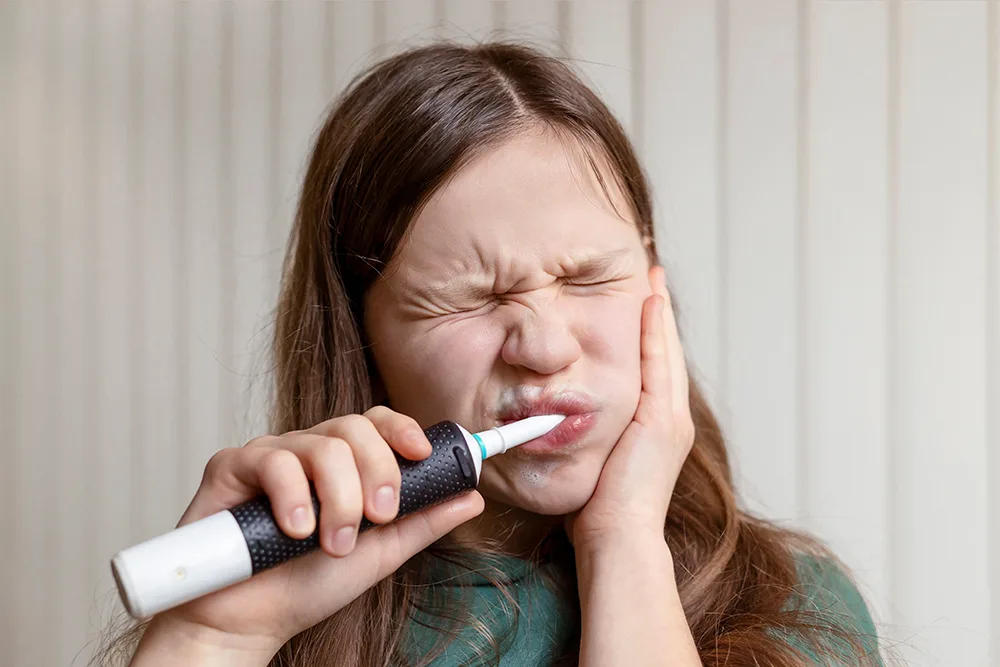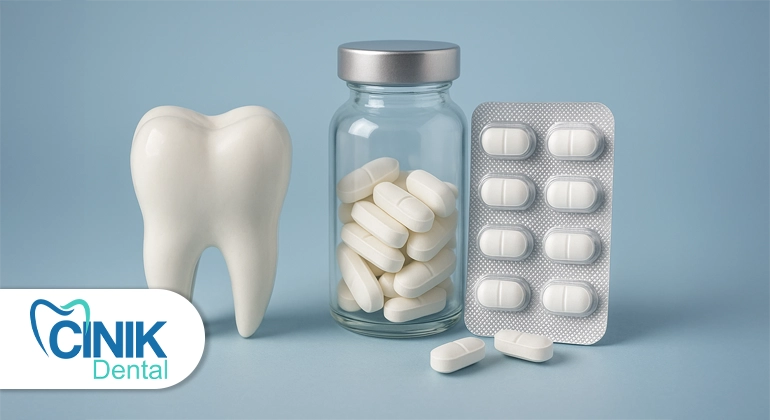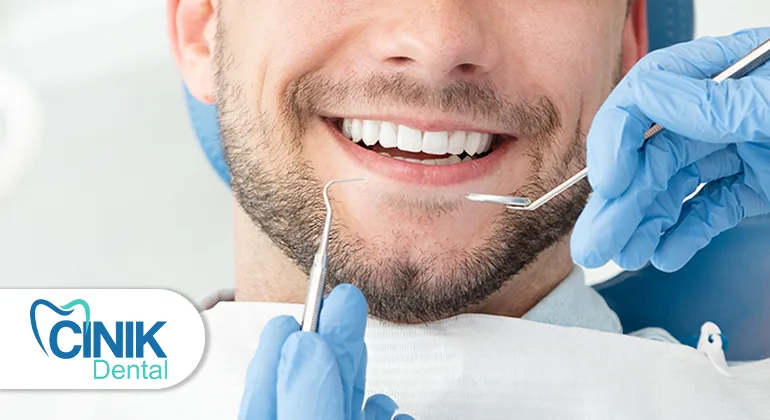Do’s and Don’ts If You Have Tooth Sensitivity – Causes & Remedies
Tooth sensitivity can be an uncomfortable and often frustrating experience, affecting your ability to enjoy hot or cold foods and beverages. Certainly, understanding this condition is crucial for effective management and relief.
In this article, we will provide a comprehensive overview of tooth sensitivity, including its symptoms and potential causes. You’ll discover practical do’s and don’ts to help alleviate discomfort, guidance on when to seek professional dental care, and effective treatments available for sensitive teeth.
Additionally, we’ll share daily habits that can prevent sensitivity from occurring in the first place. With the right knowledge and practices, you can take control of your dental health and enjoy a comfortable and self-assured smile.
Tooth Sensitivity Overview
Tooth sensitivity is often caused by exposed dentin, the sensitive underlying layer of the tooth. This may result from erosion (wear and tear) or receding gums (gum tissue pulling away from tooth structures, thereby exposing the roots).
The thinner area of dentin-covered tooth roots, which aren’t protected by the hard enamel like the crowns, has thousands of small tubules that communicate with the nerve at the center of the tooth (the pulp). Any stimulus, such as hot or cold or sweet or sour food, can pass through these dentinal tubules and irritate the nerve at the center of the tooth, producing sensations of pain or discomfort.
Sensitive teeth may be a symptom of other dental-related problems, such as cavities, gum diseases, or fractured teeth.
Who Suffers From Sensitive Teeth?
Dental sensitivity affects many people, and it can start at any time. Typically, it is more common among people aged between 20 and 40, although it can affect people in their early teens or those over 70. Most likely, women are more prone to tooth sensitivity than men.
What Are the Symptoms of Sensitive Teeth?

Dental sensitivity manifests primarily with some symptoms such as:
- Acute or shooting pain that is evoked when the crown is touched or pressured immediately
- Extreme sensitivity to hot and cold temperatures in the mouth
- Sensitivity to any sweet or acid food and drinks
- Chewing differently because of tooth pain
- Discomfort from brushing or flossing.
- Tolerance to abrasive toothpastes and mouth washes.
What Causes Dental Sensitivity?
Your teeth are protected by the enamel, which safeguards them from any outside stimuli, such as hot and cold temperatures, as well as mechanical pressure. Sensitive teeth may result from erosion of tooth enamel or tooth roots becoming exposed.
Most of the time, without this protective layer, thousands of tiny, fluid-filled channels in the dentin (called dentinal tubules) become exposed to these stimuli. Dental procedures that may lead to your teeth becoming sensitive include:
Tooth Sensitivity After Filling
Tooth sensitivity right after a filling is to be expected. Thus, you should take gentle care of that tooth for a little while; hence, it is best to avoid very hot or cold food and drinks for a few hours after the procedure while the filling sets. Whatever pain you have should go away in about a week, and sensitivity should resolve within two to four weeks.
Filling materials may provoke tooth sensitivity due to several reasons. Irritation of nerves is the most common after a deep filling that may come close to nerve endings and hurt; the good news is that these nerves may heal over time. The occlusive alignment may go awry if the filling is too high, causing an uncomfortable pressure during biting. Pulpitis can also occur, wherein a tooth’s pulp becomes inflamed due to injury or chronic dentinal damage resulting from deep cavities, and pain will ensue.
For the scenarios involving sensitivity, it is advised to take pain medication as prescribed, to brush with a soft-bristle electric toothbrush very gently, to apply desensitizing toothpaste, to chew on the other side, and to avoid food and beverages that are hot, cold, acidic, or sugary.
Tooth Sensitivity After Crown
The sensitivity of teeth underneath the crown is when the middle layer of the tooth, the dentin, becomes exposed so the crown can be fitted.
Some sensitivity in the tooth is common following dental crown treatment, though manageable. Good oral hygiene is essential: brush with a soft-bristle toothbrush lightly; floss regularly, avoid sugary foods, and do not scrub aggressively. Use toothpaste for sensitive teeth, avoid crunchy foods, and try not to grind your teeth. Over-the-counter painkillers may relieve some aches immediately. Sensitivity usually subsides after a few days, but some people might take up to six weeks to feel entirely well.
Tooth Sensitivity After Root Canal
Immediately following a root canal, the numbness in the area would typically still be present. Once that wears off, it is also normal to feel slight discomfort as your body heals for the first few days after the root canal. Soreness around the area and sensitivity in the root canal tooth are also common occurrences. If the pain is mild to moderate, you could take over-the-counter painkillers.
If there is very severe or long-term sensitivity to hot or cold, or if you feel other sharp pain associated with your tooth, consult your dentist about possible treatments.
Tooth Sensitivity After Cleaning
There are different reasons for tooth sensitivity; among them is dental cleaning, as it could prod the gums of the patient using tools that might touch sensitive areas of the teeth.
To reduce the sensitivity of the teeth after deep cleaning, you should bring changes in your daily care in the sense that you should wash your teeth with a soft-bristled toothbrush and fluoride toothpaste twice a day, floss daily, and cauсtiously scrub so as not to use aggressive scrubbing.
Limit the intake of acidic foods and drinks, preferably drink through a straw to reduce their impact. Also, a mouthguard may be needed if you grind your teeth. Though it’s common to experience tooth sensitivity after cleaning, it’s usually self-resolving, however, do call your dental provider if the symptoms persist beyond a couple of weeks. Remember, though, that cleanings are essential to the maintenance of oral health and prevention of cavities, so any uneasiness will pass quickly.

Tooth Sensitivity After Whitening
Teeth whitening can lead to sensitivity for a number of reasons, such as the temporary porosity of enamel caused by whitening gels, pressure induced by whitening trays, or irritation from bleaching agents coming into contact with the gums.
To minimize the sensitivity, consider using desensitizing toothpaste for about ten days before the procedure to block pain signals, followed by a short application of a desensitizing gel just prior to treatment. Furthermore, over-the-counter pain medications such as ibuprofen can help alleviate pain after and even post-procedure.
Tooth Sensitivity After Cavity Filling
Fillings are dental procedures wherein the dentist cleans away the decay from the tooth and fills up the empty space with new material.
A dentist would administer a local anesthetic around the tooth for comfort and then clean out the decay in the tooth with a drill. The material used to fill the cavity could be gold, silver amalgam, a composite, or porcelain. Once the anesthetic wears off, the person may feel sensitivity around the filling.
Some degree of sensitivity after filling is fairly common and may be caused by the irritation of the nerve from the filling procedure or bite misalignment following the filling. If the sensitivity remains or is intolerable, it might indicate some problem, such as pulpitis- inflammation of the tooth’s inner pulp that can stem from trauma to the tooth or deep cavities- or an allergic response to any of the filling materials, e.g., amalgam or nickel.
Usually, mild sensitivity can be expected to subside as the nerve gets better in a couple of days or weeks; however, any severe sensitivity should prompt an evaluation from your dentist, who can make adjustments to the filling or investigate other potential problems that may involve subsequent treatment, such as a root canal or antibiotics for an infection.
Tooth Sensitivity After Extraction
The sensitivity of teeth could commonly occur for several weeks following a wisdom tooth extraction and is caused by several factors related to the process of healing. With tooth removal, underlying dentin is exposed, leading to a temporary feeling of sensitivity. In addition, there can be inflammation of the gum tissue around the extraction site, causing swelling and tenderness, thus contributing to the whole sensitivity of the surrounding teeth.
Proper post-extraction care must be practiced according to your dentist’s instructions for a good recovery. This includes keeping the extraction site clean, avoiding certain foods, and taking any medication that was prescribed. Following these steps helps to reduce the risk of complications and gives a better chance for a smooth healing process, which can help alleviate some sensitivity and discomfort in the weeks following the procedure.
Aside from dental procedures, other causes of dental sensitivity include the following:
- A hard brush and brushing aggressively: Putting too much pressure on teeth brushing over time, may erode the enamel, exposing the dentin. This act can harm the gums and cause recession (the gum tissues pull away from the teeth).
- Gum recession: Some individuals have thin gum tissue constitutionally, while others may experience gum recession due to periodontal disease. In this case, the gum tissue recedes from around the teeth, exposing the roots.
- Gum disease: The inflamed and sore gum tissue might cause sensitivity since the supporting ligaments are lost, exposing the root surface that leads directly to the nerve of the tooth.
- Cracked teeth: Any chipped or broken tooth would allow bacteria from plaque to invade the pulp and cause inflammation.
- Grinding of teeth: Teeth grinding or clenching may wear down the dentin and expose underlying enamel.
- Tooth sensitivity after whitening strips: Tooth sensitivity following whitening typically occurs due to some irritation to the tooth nerve (pulp) by peroxide, which is one of the most common ingredients found in whitening products. Sensitivity of the teeth or soreness of the gums should only last a few days following whitening treatment.
- Age: Tooth sensitivity peaks between 25 and 30 years.
- Plaque formation: The presence of plaque on the root surfaces leads to dental sensitivity.
- Use of mouthwash: Certain mouth washes may contain acids that can further aggravate the sensitivity of dentin in a patient with exposed dentin (the middle layer of the tooth). Dentin is further damaged by acid.
- Consuming acidic foods: Regular intake of acidic foods such as citrus fruits, tomatoes, pickles, and tea could erode enamel.
How Long Does Tooth Sensitivity Last?
According to Dr. Sinan ÇAKIR, one of our expert dentists at Cinik Dental, “Teeth can become sensitive after getting a filling, cleaning, and placement of other forms of restorations. However, the transient sensitivity induced by these procedures usually fades away within four to six weeks.”
Do’s for Tooth Sensitivity
Sometimes, it may feel like the pain from your sensitive teeth is never-ending.
However, there are definitely good tricks for relieving the pain. Little tweaks to your everyday habits and oral hygiene can go a long way toward improving your quality of life and giving further protection to your teeth against sensitivity. Below are some easy-to-implement strategies, from using specialized toothpastes to keeping up regular dental appointments, that could help you keep a smile on your face and alleviate your tooth sensitivity.
Do use a desensitizing toothpaste option.
There are specialized toothpastes meant for enamel protection, reducing the sensitivity of the teeth. It works by blocking the tubules in the dentin. Ask your dentist to recommend one to you or you can buy it at any pharmacy.
Do use a soft bristled toothbrush
Have you brushed your teeth with a hard-bristled toothbrush before? The hard bristles can be hard on the tooth enamel, which leads to denuded dentin. Sensitive teeth should be safeguarded from abrasion by hard bristles, so use soft bristles. Many dentists favor soft bristle brushes because they are gentle on the gums and teeth.
Do use fluoride in your dental care hygiene
Speak to your dentist about topical fluoride if tooth sensitivity is present and causing trouble. The fluoride may come in toothpaste or in mouth rinse form. Your dentist might also suggest some fluoride treatments as they may help strengthen the tooth enamel.
Do ask about dental procedures for tooth sensitivity
Find out about possible bonding for sensitive teeth while visiting your dentist. In dental bonding, a resin material is bonded onto the teeth for the purpose of correcting the defects or cracks that may thereby reduce tooth sensitivity. Bonding can be useful if there is root exposure to sensitive teeth.
On dental procedures for tooth sensitivity, Dr. ÇAKIR further elaborates, “Sensitivity can develop when gums recede. In some cases, where they have receded to a great extent, gum grafts will be recommended. Gum grafting, also referred to as gingival grafting, is a surgical procedure in which tissue is removed from the mouth and attached to the area in which the gum has receded to protect the root and decrease sensitivity.”
Do practice good oral health care hygiene
Brush your teeth two to three times a day with fluoride toothpaste, or even better, a sensitivity toothpaste. Brush with small circular motion using a soft to medium-bristle toothbrush. Never brush your teeth side to side as this damages the enamel-it’s like saw on the edges.
Do monitor changes and report any prolonged issues in your teeth
If sensitivity or soreness persists for more than a few weeks, calling your dentist is a must. Persistent tooth sensitivity may indicate other problems that need addressing.
Do visit your dentist regularly
Your dentist usually checks and cleans your teeth, which helps to eliminate any additional damage. They also monitor the health of your teeth and gums to spot decay and other problems early.
Don’ts for Tooth Sensitivity
Managing tooth sensitivity involves not only proactive care but also avoiding certain habits that can exacerbate the issue. By making mindful choices in your dental routine and lifestyle, you can help protect your teeth and reduce discomfort. In this section, we’ll explore key practices to avoid, from brushing techniques to dietary choices, and the importance of consulting your dentist before undergoing any whitening treatments. These tips can help you maintain better oral health and enjoy a more comfortable smile.
Don’t brush your teeth strenuously
If you scrub your teeth vigorously, you may be doing them some harm. Don’t brush hard if your teeth are sensitive; rather try to brush them lightly for an extended time, more especially along the gum line because that is where more plaque accumulates. Brushing with a light hand may serve to ease some sensitivity.
Don’t eat acidic foods and drinks
Highly acidic food, be it sodas, juices, fruits, etc. You really do not need to stop altogether; moderation is the key here. Use a straw to consume drinks, directing the straw to the back of your mouth to minimize contact with the teeth.
Also, if your meal contains highly acidic foods, make sure to have something nonacidic with your meal to neutralize acids. An example is water with fruit. Hold back from taking something acidic during exercise or right before bedtime since saliva secretion is low at those times.
Don’t grind your teeth
Also known as bruxism, grinding and clenching your teeth with unusual pressure can severely damage them. It wears down the outer layers of enamel, causing sensitivity of the teeth. The night guard application is, in fact, a good solution to the problem. Night guards are obtainable at any pharmacy; alternatively, you might discuss with a physician who could provide one that is custom-fitted.
Don’t whiten your teeth before consulting your dentist
Brightening your teeth can increase self-assurance that can ease one’s desire of simply showing off that bright smile, but for others there is a downside. These days, teeth-whitening products are plentiful in the market. There are teeth whitening procedures done at your dentist’s clinic.
On how teeth whitening treatments can cause tooth sensitivity, Dr. ÇAKIR explains, “Peroxide is one common agent found in many whitening products, and our teeth are sensitive to that. Hence, preventive care should always be thought of when it comes to such products. Before deciding on teeth whitening, it is better to have a discussion with the dentist on the pros and cons of the procedure before actually undergoing it.”
How to Treat Tooth Sensitivity?
Once the root cause has been identified, your dental practitioner will give you one or more of the following treatments to relieve your condition:
- Desensitizing toothpaste and mouthwash
- Fluoride gel and varnishes
- Fillings for exposed roots
- Sealants and dental adhesives
- Desensitizing pastes you can get from your dentist (these are usually applied orally, not with toothbrush)
- Mouthguard to protect teeth if you grind
- In case you suffer from acute tooth sensitivity, your dentist might recommend a root canal procedure
- Gum grafts: Gum tissue grafting is a permanent fix for sensitivity resulting from receding gums. The procedure creates gum tissue to cover the most sensitive areas of your teeth so you can enjoy your favorite foods, like ice cream or hot coffee, again.
- Dental bonding: Dental bonding decreases tooth sensitivity by sealing your nerve endings, which protects your teeth from the food and drink you take, as well as the air that you breathe.
When to See a Dentist When I Have Sensitive Teeth?
For toothaches lasting more than a day or two, a visit to your dentist is recommended. The remedies mentioned above may help relieve some pain and swelling, but they do not address the cause. Leaving it untreated may cause it to worsen. Toothache is no fun, and you should have it examined if the pain persists for a few days. Your dentist will be able to nail down precisely what caused the toothache and will either treat the cause or suggest what needs to be done to clear up the problem and prevent it from occurring again.

8 Daily Habits to Prevent Dental Sensitivity
To keep your teeth healthy after tooth sensitivity treatment or to protect your tooth from enamel erosion, you might consider including the below daily habits into your routine:
- Brush your teeth gently: Harsh brushing might be removing more than plaque. Side-to-side brushing right at the gum line makes your enamel disappear faster and leads to enamel erosion. To avoid such a problem, you should use a soft-bristled brush and position it at a forty-five-degree angle to your gums to keep your enamel clean and strong.
- Limit acidic foods and beverages in your diet. This includes soda, sticky candies, carbohydrates, and foods high in sugar, as they can damage the enamel. Snack instead on: Fiber-rich fruits and vegetables, cheese, milk, plain yogurt… These will moisten your mouth and help fight acid and bacteria that can eat away at your teeth. Saliva is one way your mouth deals with them. Alternatively, you can drink green or black tea or chew on sugarless gum. If you happen to eat something acidic, do not rush into brushing your teeth immediately. Give it about an hour or so to strengthen before you scrub.
- Relax your teeth: Years of grinding can lead to enamel erosion. In some cases, stress management can help alleviate the issue, but if it doesn’t improve, your dentist can provide a splint or a mouth guard. In more serious cases, you might need a dental procedure to adjust the positioning of your teeth or even a muscle relaxant.
- Get off bleaching for a while: After going through the effort to achieve pearly whites, you might find it painful. Luckily for you, this tooth-whitening sensitivity usually has a temporary effect. Let your dentist know how the process is treating you and whether it is fine for you to continue.
- Practice stress management to avoid teeth grinding (bruxism): When we get stressed out, we might clench our jaws or grind our teeth unconsciously, mostly while sleeping. This results in toothaches and pain in the jaws, which can damage the teeth over time. Relieving stress and managing bruxism are the best options to avoid any toothache due to grinding.
- Use a fluoride toothpaste; try to stay away from any abrasive toothpastes.
- Floss at least once a day.
- Use painkillers prescribed by your dentist.
Final Thoughts
It is imperative to manage tooth sensitivity, both for oral health and the discomfort caused as a result. After learning the various causes and symptoms of sensitivity, the patient can take measures to fight this discomfort with certain practical do’s and don’ts.
However, regular check-ups with a dentist, along with open communication, will ensure that any underlying factors may be addressed while searching for proper treatment. By pursuing daily conducts that promote dental care, such tooth sensitivity could be prevented.
You may then wish to wear a healthier, more resilient smile with utmost confidence. Tooth sensitivity is nothing to live with; therefore, effective measures exist for the enhancement of your dental health.
Frequently Asked Questions
How Do I Stop My Teeth from Being So Sensitive?
You can stop your teeth from being sensitive by using a desensitizing toothpaste and practicing good oral hygiene. Severe sensitivity may be due to gum recession, cavities or cracked teeth, and may need treatment, hence, visit an expert. Your dentist can tell you why your teeth are sensitive and what treatment options you can consider to address the problem.
How Do You Calm a Sensitive Tooth Nerve?
To calm a sensitive tooth nerve, use an over-the-counter pain reliever such as acetaminophen or ibuprofen to ease the pain. Applying a cold compress, ice pack, or cold damp cloth can also numb the area, especially if there is any swelling. Additionally, rinsing with salt water or hydrogen peroxide can help relieve inflammation.
What Happens If You Ignore Tooth Sensitivity?
If you ignore tooth sensitivity, it might be very difficult for you to maintain a healthy diet, and chewing awkwardly will put unbalanced strain on the jaw, which may lead to joint pain. This sort of jaw strain may progress to a chronic condition called temporomandibular joint disorders, or TMJ, which can cause pain in the jaw and may limit movement of the jaw.
How to Get Rid of Tooth Sensitivity?
To get rid of tooth sensitivity, avoid irritants, such as consuming foods and drinks that are highly acidic such as citrus fruits, and coffee. Use a soft-bristled toothbrush to help prevent irritating your teeth and gums. Don’t brush too hard as aggressive brushing can worsen sensitivity. Use gentle circular motions while brushing.
What Causes Random Tooth Sensitivity?
Among the various factors of random tooth sensitivity are, worn enamel, exposed roots, cavities, cracks, and even corrective procedures that can lead to dents in sensitive teeth.
What Deficiency Causes Sensitive Teeth?
Some vitamin deficiencies that have been identified to cause sensitive teeth; include calcium, vitamin D, and vitamin B12. Also, when calcium is deficient in the body, it extracts calcium from bones and teeth, making them weaker.
How Do I Stop Tooth Sensitivity From Whitening?
You can stop tooth sensitivity after undergoing a teeth whitening treatment by following the below instructions:
- Take a nonsteroidal anti-inflammatory drug
- Ask your dentist about potassium nitrate and sodium fluoride gel
- Try a desensitizing toothpaste
- Switch to a soft-bristled brush
- Stay clear of cold beverages—or drink them through a straw.
Can I Have Teeth Whitening If I Have a Lot of Tooth Sensitivity?
Having sensitive teeth doesn’t preclude people from undergoing teeth whitening treatment, but precautions and a visit to the dentist before the procedure are always recommended.




Leave a Reply